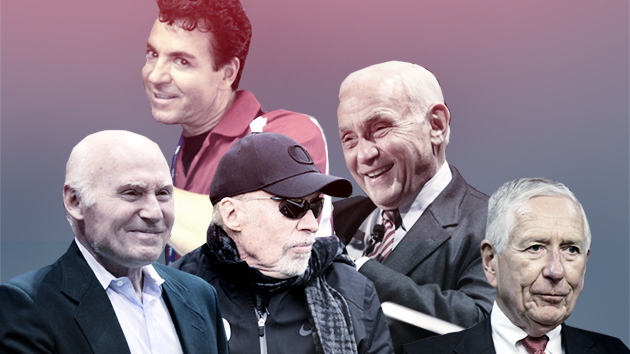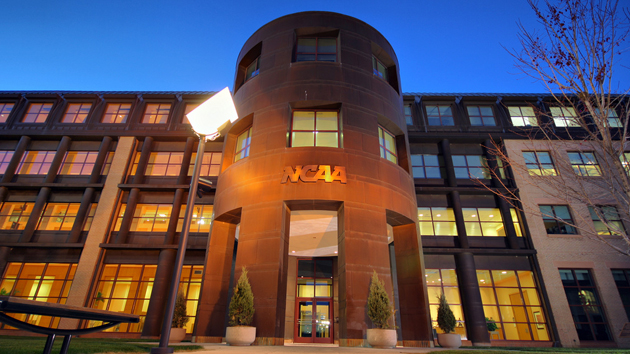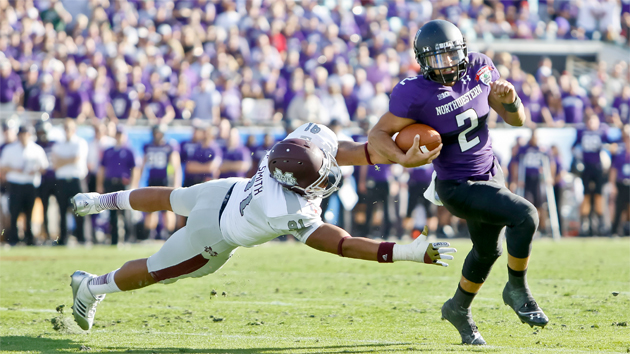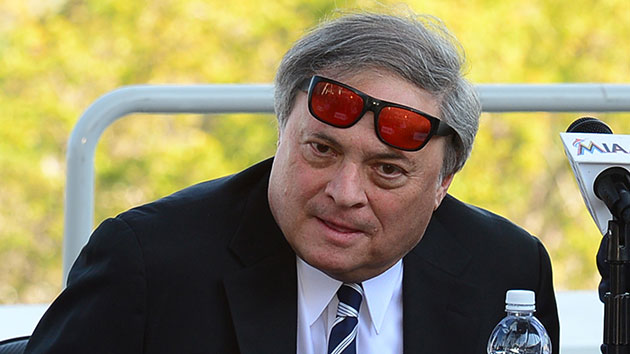
Big boosters (from left to right): Herb Kohl, John Schnatter, Phil Knight, Les Wexner, Drayton McLane Jr.
Even with millions of dollars in merchandise and ticket sale revenue, big-time college football and basketball programs pay a high price to compete. Coaches’ skyrocketing salaries, lavish training facilities, state-of-the-art stadiums and arenas: Someone has to fork over all that cash to keep up with the rivals at Big State U. Enter the loyal booster.
Over the years, boosters have played a cat-and-mouse game with the NCAA and its endless rules on amateurism. But thanks to the recent O’Bannon v. NCAA ruling, schools may need boosters more than ever. The decision allows players to be compensated up to $5,000 per year, and future court cases could raise that limit much higher. It’s not crazy to imagine that in the near future, there’ll be big-money bidding wars between programs for top recruits.
In anticipation of a new era of spendy “friends of the program,” here are Mother Jones‘ boosters of the top 25, based on this week’s Associated Press poll. It’s not a comprehensive list—in fact, feel free to add more boosters in the comments—but we tried to pull together some of college sports’ biggest names, a colorful and diverse crowd of folks with common traits: They’re all very rich, they’re all very powerful, and they’re treated with the deference reserved for university presidents and pro team owners.
1. Florida State: Al Dunlap
Known as “Chainsaw Al,” the 77-year-old Dunlap became infamous in the business world as a ruthless corporate downsizer while CEO of companies like Scott Paper. He’s been successfully sued by everyone from the Securities and Exchange Commission to his own shareholders over accounting fraud, and once physically attacked a critic. Dunlap retired in Ocala, Florida, and he and his wife have given $15 million to Seminole athletic facilities. (Dunlap, a West Point grad, never attended FSU.)
2. Alabama: Paul Bryant Jr.
Bryant is Alabama royalty: His father was Bear Bryant, the legendary Crimson Tide coach. The younger Bryant became a successful businessman, owning dog tracks that grossed millions and selling several businesses (including a cement company) for hundreds of millions. His reinsurance company, Alabama Reassurance, was implicated in a felony insurance fraud case, though Bryant came out personally unscathed. Bryant has donated more than $20 million to Crimson Tide football, and he’s currently the president of Alabama’s Board of Trustees.
3. Oregon: Phil Knight
The cofounder and CEO of Nike—worth around $20 billion—might be the most high-profile college booster in America. Knight, who was a track star during his time at Oregon, has poured $300 million into his alma mater and its athletic program, turning the Ducks into an athletic (and, arguably, sartorial) powerhouse. He’s funded stadium renovations and a football performance center considered among the most lavish in college sports. Nike has been criticized for decades for its questionable manufacturing practices—including child labor, low pay, and worker abuse—and Knight has (sort of) owned up to it, though he tends to plead ignorance and shift blame to overseas contractors.
4. Oklahoma: Christy Gaylord Everest
Everest comes from one of Oklahoma’s wealthiest and most powerful families. A former University of Oklahoma trustee, she owned the Oklahoman newspaper and a diverse array of businesses, but sold nearly all family holdings to Denver entrepreneur Phil Anschutz. The Gaylord family as a whole has donated more than $80 million to the university, including $18 million to athletic programs. (The Sooners’ football stadium is the Gaylord Family Oklahoma Memorial Stadium.) The late family patriarch, Edward L. Gaylord, is credited with shaping Oklahoma into a deep-red state by making family media properties organs for conservative viewpoints.
5. Auburn: Jimmy Rane
Known as the “Yella Fella” after his wood products—he’s CEO of Great Southern Wood Preserving—Rane is president of the Auburn Board of Trustees and an Auburn megabooster. Part of Auburn’s new football facility is named for him. Rane was close to ousted Auburn trustee and fellow millionaire booster Bobby Lowder, and once held millions of dollars in shares of Lowder’s failed bank, Colonial. Rane has given hundreds of thousands of dollars to Republicans in Alabama and elsewhere.
6. Georgia: Don Leebern Jr.
Owner of a large alcohol distribution company, Leebern is a major Georgia booster and a university regent. He was reappointed in 2012 amid numerous accusations of misconduct: He allegedly had an affair with then-gymnastics coach Suzanne Yoculan and helped oust former football coach and athletic director Vince Dooley when he refused to promote her. He’s also allegedly used his connections to secure cushy jobs for family members, and he’s donated hundreds of thousands of dollars to several Georgia governors and politicians.
7. Michigan State: Peter Secchia
Secchia, who made a fortune in the lumber industry, is a prominent Republican Party leader and fundraiser. Since the ’70s, he’s held top Michigan party posts and co-chaired countless national and state campaigns. For his money-raising and giving efforts—he’s donated hundreds of thousands to Republicans over the years—Secchia served as ambassador to Italy during the first Bush administration. The Michigan State alum has given millions to the school’s athletic programs.
8. Ohio State: Les Wexner
Wexner is the former CEO of L Brands (which includes Victoria’s Secret) and has owned and sold several other retail outlets in his career. The bra baron is worth $6 billion, making him the richest man in Ohio, and Ohio State’s deepest-pocketed booster. He gave $100 million to the school in 2011—the largest gift in its history—and the football team’s complex is named for him. An ESPN profile of former OSU prez Gordon Gee mentions he had two letters from Wexner on his desk, including one that read: “BEAT Michigan, not mimic Michigan.” Wexner has given several million dollars to Republicans, including former California Gov. Arnold Schwarzenegger.
9. Texas A&M: Monty Davis
Davis is COO of Core Laboratories, which assesses oil reserves and provides earth analysis for the energy industry, pulling in $1 billion per year. (A Glassdoor reviewer called Core management a Texas A&M “boys club.”) Davis is on the board of the Aggie booster organization, the 12th Man Foundation, and with his wife, Becky, led donations for the $12 million Davis Player Development Center.
10. Baylor: Drayton McLane Jr.
A Baylor grad and native Texan, McLane made his fortune through McLane Company, a family business he built into an international food-service conglomerate that he sold to friend Sam Walton for $50 million, plus loads of Walmart stock. He’s now worth about $2 billion. The onetime owner of the Houston Astros gave $200 million to his alma mater to fund its new football stadium, which is named after him. McLane has been a prolific donor to conservative super-PACs and Republican committees. He was also a close friend of the late Enron CEO Kenneth Lay, and defended him during his fraud trial.
11. UCLA: Jim Collins
An engineer who worked his way through UCLA, Collins built a restaurant empire in the United States and abroad, bringing hundreds of KFC franchises to Southern California and building the Sizzler chain of restaurants internationally. Collins retired in 2011, but has kept up his involvement with UCLA: He was the lead donor for the campaign to renovate Pauley Pavilion, the home of Bruins basketball. Collins has given over $60,000 to GOP candidates and pushed heavily for an open primary system in California, successfully implemented by Proposition 14 in 2010.
12. LSU: James Bernhard Jr.
One of Louisiana’s most successful businessmen, Bernhard built the Shaw Group, an energy, chemical, and construction company, into a Fortune 500 business before selling it in 2013 for $3 billion. A major LSU benefactor, Bernhard was once named the Tiger booster organization’s “Member of the Year.” He is also a prolific Democratic donor—notably, he gave $100,000 to Virginia Gov. Terry McAuliffe—and was briefly a candidate for the Secretary of Energy post in President Obama’s cabinet.
13. Stanford: John Arrillaga
The real estate billionaire grew up poor and earned a scholarship to Stanford as a basketball player. With partner Richard Peery, he bought up Silicon Valley farmland in the ’60s and turned it into office space now occupied by Google and Apple. He’s Stanford’s biggest donor, having given hundreds of millions to the university and its athletic programs, including the renovation of its football stadium. His political giving tendencies are idiosyncratic: He gave thousands to the gubernatorial campaign of Republican Meg Whitman and also gave to the campaign of New York City’s progressive mayor, Bill de Blasio.
14. Southern California: B. Wayne Hughes
Hughes built Public Storage, the largest self-storage company in the United States, from a single facility. Now worth $2.5 billion, Hughes is a USC trustee and, befitting a longtime athletics megadonor, was inducted into the Trojan sports hall of fame. Fiercely private, Hughes is nevertheless politically active: He’s given millions to Karl Rove’s American Crossroads super-PAC and supported Arnold Schwarzenegger’s campaigns for governor.
15. Ole Miss: Robert Dunlap
Dunlap owns a chain of tire stores in the South and has been a Rebels booster for decades. In 2010, when the university moved to get rid of its Confederate caricature mascot, Colonel Reb, Dunlap was part of a booster group opposing the decision, even suggesting that he’d stop his philanthropic giving if Reb got the boot. Well, Reb is no longer, but apparently Dunlap is still a valued booster: As of 2011, he’s named as a charter member of the Vaught Society, which recognizes those who have given $350,000-plus to Ole Miss athletics in their lifetimes. (Dunlap says he’s given more than $1 million.)
16. Notre Dame: John W. “Jay” Jordan
Jordan, who has been called a “merchant banking pioneer,” is the cofounder and co-CEO of Jordan Company, a private equity firm. The Chicagoan has sold billions of dollars’ worth of companies. A former Fighting Irish football player, Jordan has donated tens of millions to his alma mater. He has said that college athletes should get paid a “small stipend,” and he’s been a major donor to House Speaker John Boehner.
17. Arizona State: Ira Fulton
Fulton, a self-made real estate magnate, is one of the most generous philanthropists in the West. A former Arizona State football player, Fulton has given more than $100 million to his alma mater and sits on the board of the Sun Devil Club, the school’s booster organization. A devout Mormon, Fulton allegedly used his clout with the university to shut down the hiring of a scholar critical of the church.
18. Wisconsin: Herb Kohl
The former four-term US senator is one of the wealthiest people in Wisconsin and a major booster of Badger athletics. Kohl, who built his parents’ grocery stores into a nationwide retail chain, gave $25 million for the construction of a new basketball arena, which was named the Kohl Center. He also owned the Milwaukee Bucks for nearly 30 years, and sold the team in April for $550 million, pushing his then-$264 million net worth even higher.
19. Nebraska: Howard Hawks
Hawks is the founder and chairman of Tenaska, one of the largest private energy companies in the country, specializing in power plants, natural gas, and private equity. Nebraska’s new football training facility is named after him, and he and his son donated generously to the Huskers’ new basketball facility. Hawks spent nearly $200,000 of his own money to get on the University of Nebraska’s Board of Regents. He is also a major donor to Republican and “nonpartisan” Nebraska politicians.
20. Kansas State: Jack Vanier
Hailing from a prominent, wealthy Kansas ranching family, Vanier gave the largest gift in Kansas State history—$60 million—which included $20 million to renovate the Wildcats’ football stadium. Perhaps the biggest beef man in a beefy state, Vanier served for 26 years on the board of agribusiness giant Archer Daniels Midland, which was the subject of a historic price-fixing suit in 1993. The Salina (Kan.) Journal reported that many felt the investigation—later the subject of a book and film called The Informant—was not taken seriously by the ADM board. He was close with Bob Dole, who allegedly secured a Department of Agriculture position for Vanier’s daughter in 1988.
21 (tie). South Carolina: Joe Rice
Rice is cofounder of Motley Rice, a hugely successful South Carolina law firm. He’s one of America’s most prolific trial lawyers, having won several historic, multibillion-dollar settlements, including a $246 billion victory over the tobacco industry in 1998, which remains the largest civil settlement in American history. The Gamecocks’ new $8.5 million athletics center is in Rice’s name, and coach Steve Spurrier reportedly flew to the Bahamas with Rice on his private plane, and vacationed on Rice’s yacht. Spurrier said Rice is “sort of like the owner of a team.”
21 (tie). North Carolina: Charlie Loudermilk
Loudermilk, a high-profile Atlanta philanthropist, founded and built Aaron’s, a furniture and appliance retailing and leasing company worth $2 billion. The FDIC is suing him over allegations that he presided over predatory lending practices while he was chairman of Buckhead Community Bank in Atlanta. The student-athlete center in Chapel Hill, to which Loudermilk donated $7.5 million, is named for him. He donated thousands to Newt Gingrich’s presidential campaign, but has also given to civil rights hero and longtime Democratic Rep. John Lewis, who represents Atlanta.
23. Clemson: Thomas Chapman
Chapman is the former CEO and chairman of Equifax, one of America’s largest credit agencies. The company has sparred occasionally with the Federal Trade Commission, which has successfully sued Equifax and other credit firms for violating the Fair Credit Reporting Act. Chapman is one of Clemson’s biggest benefactors, having given millions to athletics and academics there. He played baseball on scholarship there and went on to a brief professional career, playing in the Philadelphia Phillies organization in the 1960s.
24. Missouri: Don Walsworth
This big-time booster heads up Walsworth Publishing, a Missouri-based publishing company that specializes in high school yearbooks. He played forward on the basketball team during his time at Mizzou, and after making his millions in the yearbook biz, Walsworth has given back generously. In 2013, he gave an $8.3 million gift to the school’s athletic program. He’s also an active political giver, usually supporting Missouri Democrats.
25. Louisville: John Schnatter
You might know Schnatter better as the “Papa” behind Papa John’s, the pizza chain he founded in 1984. He did not attend Louisville but is a lifelong resident of the area and the school’s most high-profile booster. Since 1996, he’s donated more than $20 million to the school and paid $5 million to secure naming rights to the football stadium, Papa John’s Cardinal Stadium. (He famously enjoys himself at games—sometimes a little too much.) The pizza baron, reportedly worth $600 million, has donated millions to conservative causes, hosted Romney fundraisers and is linked closely to the Koch brothers. He also threatened to cut worker hours and raise pizza prices due to Obamacare.
















